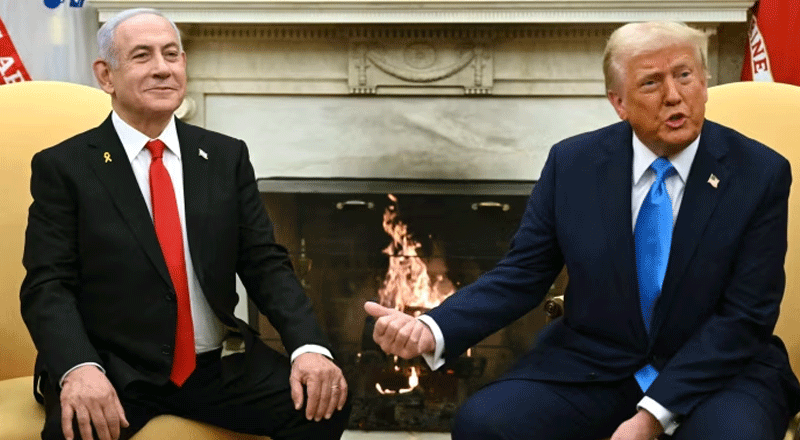
Trump’s Gaza Takeover Proposal: Bold Vision or Reckless Gambit?
In a shocking and unprecedented announcement, U.S. President Donald Trump declared that the United States would take over the Gaza Strip, clear its war-ravaged remains, and develop it economically. This proposal, revealed at a press conference alongside Israeli Prime Minister Benjamin Netanyahu, has upended decades of U.S. policy regarding the Israeli-Palestinian conflict and has sparked significant controversy. Trump's vision also includes the permanent resettlement of Palestinians from Gaza to neighboring countries, a suggestion that has been widely condemned as a violation of international law. With fierce global reactions pouring in, this plan presents both potential opportunities and grave concerns.
The Pros: A Vision for Economic Transformation
Economic Development and Stability
Trump’s argument for a U.S. takeover of Gaza centers on economic development. He envisions transforming the region into a prosperous hub, referring to it as the potential “Riviera of the Middle East.” By investing in infrastructure, clearing unexploded bombs, and fostering economic activity, Trump claims that the U.S. could bring stability to a historically volatile region. Proponents argue that such a plan could create thousands of jobs and introduce foreign investment, paving the way for long-term peace.
A Fresh Approach to a Longstanding Conflict
Supporters of Trump’s plan, including Netanyahu, praise his willingness to “think outside the box.” Decades of diplomatic negotiations and conventional peace processes have largely failed to produce a lasting solution for Gaza. Advocates contend that Trump’s radical reimagining of Gaza’s governance could serve as a necessary jolt to a stagnant conflict, forcing new negotiations and potential realignments among regional actors.
The Cons: Legal, Ethical, and Logistical Challenges
Violation of International Law
One of the most glaring criticisms of Trump’s proposal is its apparent disregard for international law. The permanent resettlement of over two million Palestinians from Gaza into neighboring countries would likely constitute forced displacement—a violation of international legal norms. Many human rights organizations have decried the plan as tantamount to ethnic cleansing.
U.S. Military Involvement and Occupation Risks
Trump’s plan also raises serious questions about military commitment. Historically, the U.S. has avoided direct military deployment in Gaza, recognizing the complexities of governing the enclave. Critics warn that a U.S. takeover would likely result in prolonged military occupation, drawing America into another unwinnable conflict reminiscent of Iraq and Afghanistan. As former intelligence officer Jonathan Panikoff noted, such an endeavor would demonstrate that Washington has not learned from its past missteps in the Middle East.
Global Backlash and Diplomatic Fallout
World leaders and organizations have largely condemned Trump’s remarks. Saudi Arabia has firmly rejected any attempts to displace Palestinians from their land and has reiterated its stance that normalization with Israel is contingent upon the establishment of a Palestinian state. Other Western allies, including Australia and members of the European Union, have reaffirmed their commitment to a two-state solution. Within the U.S., Democratic lawmakers have harshly criticized the proposal, with Senator Chris van Hollen calling it “ethnic cleansing by another name.”
Netanyahu’s Calculated Response
Israeli Prime Minister Netanyahu has remained cautious in his response, stopping short of explicitly endorsing Trump’s proposal. While acknowledging Trump’s creative approach, Netanyahu appears to be balancing his personal rapport with the president against broader geopolitical considerations. With his own political survival at stake, Netanyahu is keenly aware that any drastic shift in policy could provoke internal discord within his coalition and international condemnation.
The Political Motives Behind the Proposal
Trump’s Pattern of Extreme Policy Positions
Political analysts suggest that Trump’s proposal might be less about actual implementation and more about setting the parameters for future negotiations. Throughout his first term, Trump often adopted extreme positions on foreign policy matters, many of which he later walked back. This approach, some argue, is designed to push the conversation in a direction that favors his strategic interests. In this case, Trump’s proposal could serve to pressure regional players into accepting alternative, less radical solutions that still align with his broader vision.
Expansionist Rhetoric and Global Implications
Some critics have linked Trump’s statements to a broader pattern of expansionist rhetoric. In his first two weeks back in office, he has floated ideas about the U.S. taking control of Greenland, securing the Panama Canal, and even making Canada the 51st state. This aggressive stance, detractors warn, could embolden authoritarian regimes such as Russia and China, giving them justification for their territorial ambitions in Ukraine and Taiwan.
Humanitarian Concerns and Ethical Considerations
The Future of Gaza’s Displaced Population
A major question left unanswered by Trump is what would happen to Gaza’s Palestinian population. His suggestion that Jordan, Egypt, and other Arab states would absorb them has been met with outright rejection from those governments. Forced displacement not only violates ethical principles but also risks further destabilizing the region, increasing tensions and possibly fueling extremism.
The Reality on the Ground
A United Nations damage assessment in January estimated that clearing the rubble left by Israel’s bombardment of Gaza could take 21 years and cost up to $1.2 billion. The sheer scale of destruction raises serious doubts about the feasibility of Trump’s vision. Additionally, the ongoing humanitarian crisis—including shortages of food, water, and medical supplies—suggests that immediate relief efforts should take priority over grandiose redevelopment plans.
A Plan Destined to Fail or a Catalyst for Change?
Trump’s Gaza takeover proposal has ignited a firestorm of controversy, with supporters praising his boldness and detractors condemning it as reckless and legally dubious. While the idea of transforming Gaza into an economic powerhouse may sound appealing in theory, the reality of forced displacement, military occupation, and international legal violations make the plan highly impractical and ethically problematic.
In the broader geopolitical context, this proposal may serve as a political maneuver rather than a genuine policy initiative. By staking out an extreme position, Trump could be attempting to influence future negotiations while rallying his base with provocative rhetoric. However, if implemented, his plan would not only upend decades of U.S. policy but also risk further destabilizing an already volatile region.
As the world watches and reacts, one thing remains clear: the future of Gaza cannot be dictated unilaterally. Any sustainable resolution must involve meaningful dialogue, adherence to international law, and respect for the rights and aspirations of the Palestinian people. Whether Trump’s proposal serves as a wake-up call for more serious diplomatic efforts or simply fades into the annals of controversial political stunts remains to be seen.
(With inputs from agencies)










